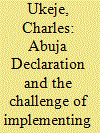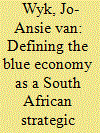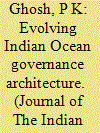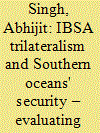|
|
|
Sort Order |
|
|
|
Items / Page
|
|
|
|
|
|
|
| Srl | Item |
| 1 |
ID:
142481


|
|
|
|
|
| Summary/Abstract |
Over the past two decades, the significance of the Gulf of Guinea and the wider South Atlantic Ocean has become incontrovertible in view of the spectrum of geo-strategic interests – commercial, energy, military, security and political – converging within the zone. Due to its vastness and lack of capacity to exercise adequate writby littoral states, the maritime landscape have become some of the most dangerous in the world: with frequent incidences of piracy, oil bunkering, trafficking in persons, weapons, illicit drugs and fake pharmaceutics, and criminal activities that are undermining maritime safety and security. A major debate is now brewing- in scholarship as well as in public policy circles- on the implications of developments in the maritime domain for security and development in Africa; including those around the challenges and opportunities facing Gulf of Guinea countries. Drawing on the insights as well as outcomes of a major conference on ‘African Approaches to Maritime Security: The West and Central African Perspectives, this article reviewed the challenges and opportunities that West and Central African countries face in view of the threats posed from, and by, their maritime domains; and their implications for governance, security and development. It further examined the prospects for the emergence of a putative maritime security community in the Gulf of Guinea, and across the South Atlantic.
|
|
|
|
|
|
|
|
|
|
|
|
|
|
|
|
| 2 |
ID:
142478


|
|
|
|
|
| Summary/Abstract |
The present text discusses Brazilian's perspectives on South Atlantic security, the prospects of its engagement in fostering maritime security governance in the axis linking the South Atlantic and the Indian Oceans and the role that the India, Brazil and South Africa Dialogue Forum (IBSA) might play in this regard. It addresses Brazil's geostrategic interests and concerns regarding its maritime projection and its perspectives towards security and maritime cooperation within IBSA. Thereafter, it contrasts these perspectives with the priority currently assigned to the South Atlantic in its defense policy and to the political and diplomatic valuation of the South Atlantic Zone of Peace and Cooperation as the proper institutional framework to foster maritime governance in the region. It concludes by pointing out that at present there are no immediate and mid-term incentives strong enough for Brazil to change its primary focus on the South Atlantic to favour the emergence of a bi-ocean governance framework.
|
|
|
|
|
|
|
|
|
|
|
|
|
|
|
|
| 3 |
ID:
142477


|
|
|
|
|
| Summary/Abstract |
In 2014, the South African government announced Operation Phakisa in order to stimulate the country's blue economy. Operation Phakisa's strong focus on maritime economic matters ignores two unresolved issues in respect of South Africa's maritime economy and maritime diplomacy, namely the country's extended continental shelf claim. If successful in its claim, South Africa's territory will increase significantly (thus a 10th province) and thus its security and economic opportunities and challenges. The latter includes the exploration and exploitation of extended shelf resources such as oil and gas, gas hydrates, seabed mining, and marine genetic resources. As very little legal precedent and state practice exists in respect of the actual delimitation of the extended continental shelf, South Africa's claims, which overlaps with that of its neighbours Mozambique and Namibia, could contributes to significant insecurity between these states. The paper concludes with some policy recommendations to address the overlapping claims, and promote an Indian Ocean–South Atlantic dialogue on oceans governance and maritime security cooperation.
|
|
|
|
|
|
|
|
|
|
|
|
|
|
|
|
| 4 |
ID:
142479


|
|
|
|
|
| Summary/Abstract |
This paper analyses two interrelated issues. The first is a description and discussion of Australian identity dilemmas and contested regionalisms as a backdrop to an understanding of Australia's degree of engagement with regional security regimes. Throughout its post-colonial history Australia has been characterised according to three main geopolitical orientations – continental, geopolitical role and maritime. It is argued that Australia only came to fully realise its maritime orientation in policy terms towards the end of the Cold War period. The second issue in this paper evaluates arguments in favour of the need for an overall Indian Ocean Maritime Security Regime (IOMSR) and it is suggested that an inclusive model, built around energy security stakeholders, is much preferred from the viewpoint of long-term regional stability. This paper describes overall Indian Ocean (IO) regional security concerns and arrangements and then focuses on the nature of IO maritime security and insecurity and the initiatives currently in place to deal with such issues. Five options for the creation of a new IOMSR are described and evaluated and Australia's place within each of these is discussed.
|
|
|
|
|
|
|
|
|
|
|
|
|
|
|
|
| 5 |
ID:
142482


|
|
|
|
|
| Summary/Abstract |
The vast Indian Ocean is an active oceanic body encompassing extensive sea borne trade/commerce and energy transfers. Unfortunately, it is also a region plagued with a plenitude of military, economic, religious and racial insecurities and asymmetric maritime threats. However, the common thread that binds the littorals is that most of the regional trade is sea borne and hence it forms one of the primary drivers of economy in the region. In this context, a unified approach towards sea governance for overcoming myriad maritime threats and challenges facing the littorals is a diminished factor. The reason being that is the current maritime security architecture in the region and the various fora that uphold the same are mostly listless and in dire need of impetus. Comparatively bi/multilateral naval engagements have been more successful. Multilateral exercises like the MILAN and IBSAMAR (as a maritime extension of IBSA) have ensured a degree of inter-operability and helped in the maintenance of “good order at sea”. But these naval engagements suffer from inherent lacunae and cannot be substituted for a formal forum. The issue of sea governance is far larger than bi/multilateral naval meets and requires holistic approaches that may be missing from such naval exercises. This article suggests methodologies to infuse energy into existing multilateral constructs and make them relevant towards better sea governance rather than create superfluous newer ones which are often impractical.
|
|
|
|
|
|
|
|
|
|
|
|
|
|
|
|
| 6 |
ID:
142480


|
|
|
|
|
| Summary/Abstract |
The emergence of India–Brazil–South Africa (IBSA) as a key catalysing agent in the security affairs of the Global South is a development of deep political and strategic significance. Since 2008, the IBSA maritime exercises between India, Brazil and South Africa have played a critical security role in the South Atlantic–Southern Indian Ocean theatre, providing a foundation for a broader, more comprehensive regional initiative. The Southern oceanic littorals, however, do need not just need protection against non-traditional threats, but also a workable model of ocean governance that can revive ‘maritime development’ by kick-starting the regional marine economy and reinvigorating the civilian maritime sector. Doing so will require robust contribution from India, whose maritime agencies are well-placed to play an important security and capacity building role.
|
|
|
|
|
|
|
|
|
|
|
|
|
|
|
|
|
|
|
|
|